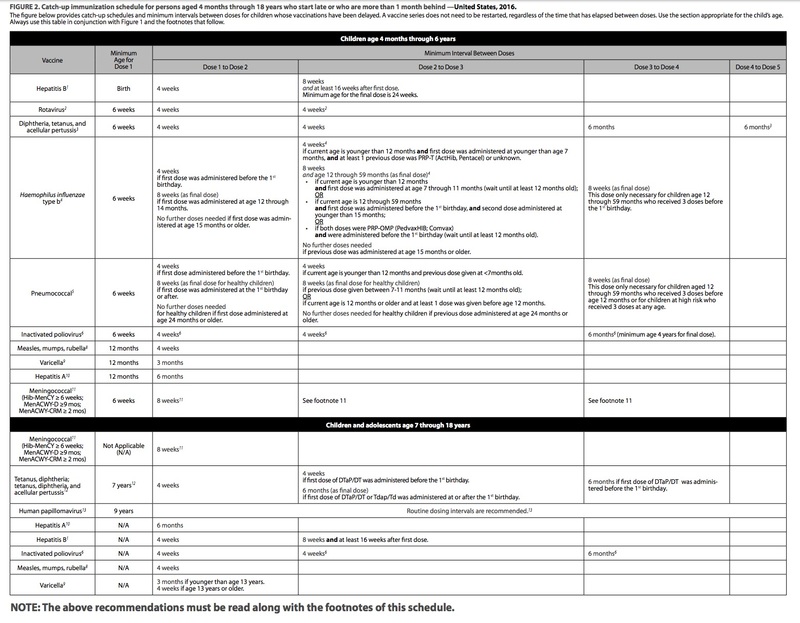FA16 Immunization Module’s Updates
Life can get in the way of immunizations
Immunizations can be life-saving but physicians often find themselves struggling with patients who fall behind on their schedules. Most often this is due to parents who do not understand the importance of these immunizations and prioritize other things over taking infants to the doctor. Often during well visits, parents it can often feel as though their time is wasted. Unfortunately, this leads to many infants and children falling behind leading to decreased herd immunity. Below is the CDC’s catch up schedule and to say it is complex is a bit of an understatement. Often times each vaccine requires specific schedules which may differ from the other vaccines which the child is required to have. This leads to the discouragement of both the parent and the physician because the system is so complex.
Other things may also complicate these vaccination schedules. Patients traveling, moving or having co-existing conditions may impair the ability of the child to remain current on their vaccination schedules. There are a couple of things that physicians can do to make sure that they are providing the best care for their patients. First, they must take every opportunity possible to make it easy for patients to receive their immunizations. The CDC allows for four days of grace period prior to a scheduled immunization in order to make it so patients do not have to return and physicians should take advantage of this. Second, they must remember that there are only three contraindications to vaccination. These are severe allergic reactions, encephalopathy following pertussis immunization and rotovirus vaccines in patients with severe combined immunodeficiency. Finally, they must help parents understand the importance of bringing in their patients in the future so that they can catch up with their vaccines as soon as possible. All of these make it easier for the physician to get all of their patients up to date.
Recommended Immunization Schedules for Persons Aged 0 Through 18 Years, CDC, http://www.cdc.gov/vaccines/schedules/downloads/child/0-18yrs-combined-schedule-bw.pdf
Principles of vaccination, CDC, http://www.cdc.gov/vaccines/pubs/pinkbook/downloads/prinvac.pdf



It is unfortunate that parents are too busy or forgetting to keep up with their child's vaccinations. Many children, especially those are immunocompromised, depends on the herd immunity to remain safe. It is especially dangerous when there is an aggregate of unvaccinated children in one area at one time. This was exactly what happened in December of 2015 at the California Disneyland that lead to the spread of Measles outbreak across multiple states. It is the physician's job to make sure the parents understand the importance of keeping up with those vaccinations and sticking with the schedule.
I think another issue is that even with parents who do understand the importance of vaccinating their children, it's just really easy to lose track of when to bring their kids in to see the doctors because of how complicated the system is. It's a health literacy issue where even though parents want the best for their children's health, they might not fully understand the how the schedule works when explained to them (and they might be to embarrassed to ask for clarification). It's a physician's duty to ensure that the parents understand exactly when and why they should be bring their children back for each vaccination.
It's interesting to me that so many parents fail to keep their children on their immunization schedules, especially considering how important vaccinations are to their health. I think physicians should stress the importance of keeping up with immunizations, so that their patients understand the risks of falling behind. Increasing the flexibility and availability of vaccinations would also be a great benefit for busy patients and parents.